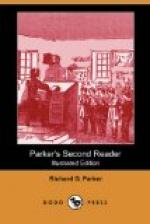LESSON XXXIX.
Obstinacy.—LESSONS WITHOUT BOOKS.
1. There is a certain fault which almost all children have in a greater or less degree. It is called by different names; sometimes it is termed wilfulness, sometimes pertinacity, and sometimes it receives the still harsher name of obstinacy.
2. Almost all our faults are owing to the perversion or abuse of propensities originally good; and perseverance, when carried too far, or expended upon unworthy objects, becomes a troublesome infirmity.
3. Louisa and Emily had both something of this infirmity, but differing both in degree and in its mode of operation.
4. What are called little things did not trouble Emily at all; and, on the contrary, they troubled Louisa very much.
5. But, when anything did seem peculiarly desirable to Emily,—when she set her heart upon having her own way,—she carried her perseverance to a degree which deserved to be called obstinacy.
6. She could give up, as children term it, with less effort, and more grace, than most others; but if anything determined her not to give up, she was immovable.
7. “You are almost always in the right,” my daughter, her father once said to her, “and Heaven preserve you from error; for when you once fall into it, you will be too apt to persevere.”
8. It happened, at one time, that she and Louisa were having some nice sun-bonnets made. Emily went for them at the time when they were to be finished, and finding only one completed, immediately appropriated it to herself, because she was really in greater need of it than Louisa, who had one that answered her purpose very well.
9. Louisa resented this, because that, being the eldest, she considered herself as having the first right; but Emily could not be persuaded to give up, although Louisa’s equanimity was very much disturbed on that account.
10. If it had been proposed to her beforehand to let Louisa have the bonnet voluntarily, she would not have hesitated, for she was not selfish; but when Louisa claimed it as a right, she resisted.
11. Her mother afterwards told her that she should always avoid irritating the peculiar humors of her companions. “You,” said she, “would not have minded waiting for the other bonnet a day or two, but to Louisa it was quite a serious evil.”
12. And here let me remark upon the proneness which all children have to magnify the importance of little things. A strife often arises among them, about just nothing at all, from a mere spirit of competition.
[Illustration]
13. One says, “This is my seat.” Another, who would not else have thought of desiring that particular seat, immediately regards it in the light of a prize, and exclaims, “No, I meant to have that seat; and I had it just before you took it.”




